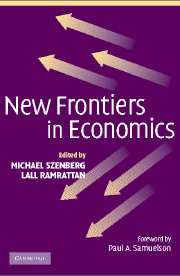Book contents
- Frontmatter
- Contents
- List of Contributors
- Foreword by Paul A. Samuelson
- Preface
- Acknowledgments
- Introduction
- PART I INFORMATIONAL BEHAVIORAL ECONOMICS AND FINANCE
- 1 Information and the Change in the Paradigm in Economics
- 2 Behavioral Economics
- 3 Experiments with Financial Markets: Implications for Asset Pricing Theory
- 4 Two Puzzles of Asset Pricing and Their Implications for Investors
- PART II MACROECONOMICS AND PUBLIC POLICIES
- PART III INTERNATIONAL TRADE AND DEVELOPMENT
- PART IV CONTRACTS, LAW, AND GAMING
- Author Index
- Subject Index
- References
1 - Information and the Change in the Paradigm in Economics
Published online by Cambridge University Press: 06 July 2010
- Frontmatter
- Contents
- List of Contributors
- Foreword by Paul A. Samuelson
- Preface
- Acknowledgments
- Introduction
- PART I INFORMATIONAL BEHAVIORAL ECONOMICS AND FINANCE
- 1 Information and the Change in the Paradigm in Economics
- 2 Behavioral Economics
- 3 Experiments with Financial Markets: Implications for Asset Pricing Theory
- 4 Two Puzzles of Asset Pricing and Their Implications for Investors
- PART II MACROECONOMICS AND PUBLIC POLICIES
- PART III INTERNATIONAL TRADE AND DEVELOPMENT
- PART IV CONTRACTS, LAW, AND GAMING
- Author Index
- Subject Index
- References
Summary
INTRODUCTION
Information economics has already had a profound effect on how we think about economic policy, and is likely to have an even greater influence in the future. Many of the major political debates over the past two decades have centered around one key issue: the efficiency of the market economy, and the appropriate relationship between the market and the government. The argument of Adam Smith suggested, at best, a limited role for government. The set of ideas that I will present here undermined Smith's theory and the view of government that rested on it.
I began the study of economics some forty-one years ago. At the time, it seemed to me that if the central theorems that argued that the economy was Pareto efficient – that, in some sense, we were living in the best of all possible worlds – were true, we should be striving to create a different world. As a graduate student, I set out to try to create models with assumptions – and conclusions – closer to those that accorded with the world I saw, with all of its imperfections. My first visits to the developing world in 1967, and a more extensive stay in Kenya in 1969, made an indelible impression on me. Imperfection of information, the absence of markets, and the pervasiveness and persistence of seeming dysfunctional institutions, like sharecropping, attracted my attention.
- Type
- Chapter
- Information
- New Frontiers in Economics , pp. 27 - 67Publisher: Cambridge University PressPrint publication year: 2004
References
- 6
- Cited by



